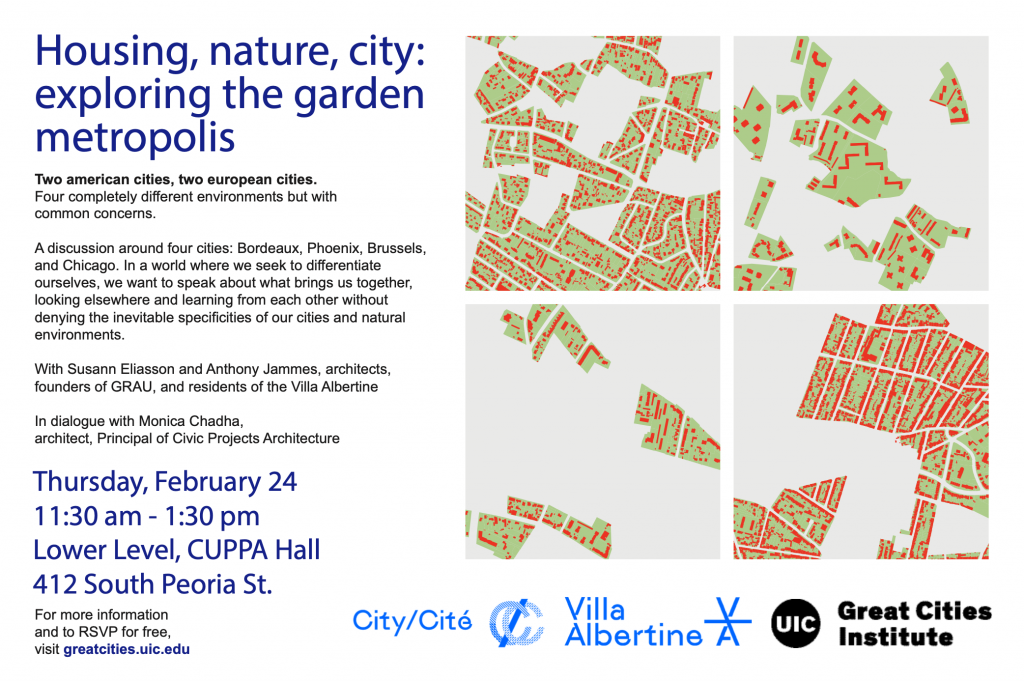


Image Source: Street Support
Guest Author: Kathryn Bocanegra, PhD, LCSW
Assistant Professor, Jane Addams College of Social Work
Affiliate, Great Cities Institute
Over the past decade Chicago has sustained public criticism in its continual struggle to reduce shootings and homicides. In 2021 there were 797 homicides in Chicago and 3,677 non-fatal shooting victims. Although Black residents represent approximately 30% of Chicago’s population, 81.4% of the homicide victims in 2021 were Black. There is a clear spatial and racial concentration of violent deaths in Chicago.
As a response to this spike in violence, Chicago’s philanthropic community created a funding coalition to fund 2 innovative approaches to reduce shootings and homicides: a city-wide network of community-based violence prevention organizations (Communities Partnering for Peace), and READI Chicago, an evidence-based initiative targeting men most at-risk of becoming a victim or perpetrator of gun violence. In 2019 the City of Chicago initiated its first Office of Violence Reduction and in 2020 released its first round of community-based grants with $7.5 million going to fund street intervention work of CP4P partners. Central to the work of CP4P, READI Chicago, and the City’s Office of Violence Prevention is street intervention work.
Street intervention work involves proactive community engagement of individuals who are involved in gangs, cliques, or other street organizations to reduce their risk of violence perpetration or victimization. At a time when distrust in police is exceptionally high, street intervention workers are the primary reference point for safety in Chicago’s Black and Latinx neighborhoods and stand at the epicenter of public debates on reducing violence, defunding the police, and undoing the harms of structural racism.
We’re always going to be Black and Brown to law enforcement. We’re always going to look like a gang member to the rival gang. We’re always going to be ex-felons, or former incarcerated people that people look at with less regard, or don’t take our words seriously. Or see our line of work as insignificant, or as really a consequence of not being able to do something more and better with our lives.
The work of reducing gun violence, however, involves high levels of stress and trauma. Street intervention workers are first responders who work with individuals who are most likely to be victims/ perpetrators of violence to engage them in a mentoring relationship while connecting them to social supports. As first responders, they frequently respond to homicide scenes, mediate conflicts involving weapons, attend funerals for deceased participants, and witness other forms of trauma associated with community violence. Street intervention professionals differ from other categories of first responders in that the majority of such employees have shared histories with their clients. Many were formerly street-involved, affiliated with street organizations, and were potentially involved in the criminal legal system. Thus, not only do they have similar trauma profiles to the individuals they work with, they are repeatedly exposed to the same traumatic stressors as part of their professional role. Chronic exposure to community violence is a normalized occupational hazard within this profession with unexamined, and potentially negative, consequences.
There are certain areas in Chicago, it’s like, I wouldn’t walk a cat through there. But we help them guys there too, so it pushes me but same time, in the back of my head is like, I don’t want anybody to pull up and start shooting and I end up getting shot and my family’s, you know, bury me or, you know, uh, you know, come to see me in the hospital. You know, to see if I’m gonna make it through. You know, I don’t want my family going through that. But I know it’s a risk that we take every day when we, you know, do what we do.
The study “Between a Bullet and Its Target” involved 35 in-depth interviews with Chicago’s street intervention workers and their supervisors. The findings from the study can be found on the website www.streetsupport.org. The website summarizes:
It is the hope of the research team that scholars, advocates, and practitioners concerned about building the civilian infrastructure for public safety in Chicago will review the resources available on the website www.streetsupport.org. Safe communities begin with a healthy frontline workforce, and we need to do everything possible to support individuals on the frontline of waging peace in their communities. Their success can be measured in human lives.
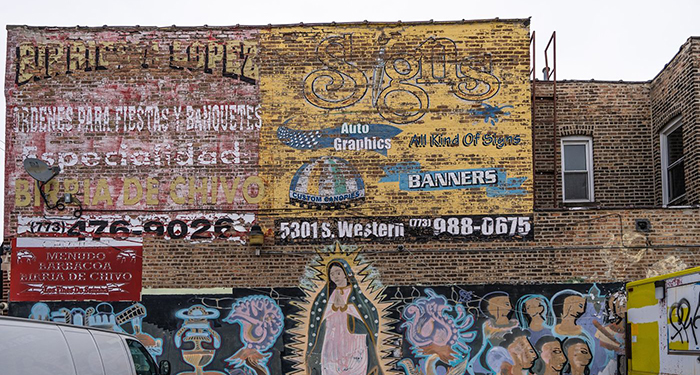
Image Source: The Wall Street Journal
The Wall Street Journal interviews Teresa Cordova, director of the Great Cities Institute and professor of urban planning and policy at UIC, and Dick Simpson, UIC professor of political science, in a story about the ongoing battle over the remap of Chicago’s wards and Latinos gaining more clout as the city’s demographics have changed.
In the first half of the 20th century, hundreds of thousands of Black southerners came to Chicago, drawn by the city’s growing industrial base, said Teresa Córdova, director of the Great Cities Institute at the University of Illinois at Chicago, which tracks population trends in the city. When industrial jobs began drying up in the late 1970s and 1980s, Black residents started leaving for the suburbs or other places such as Atlanta or Texas, where job prospects were better, cutting their numbers by about a third between 1980 and 2015, she said.
As they departed, the already segregated neighborhoods they left behind lost key pillars of stability, exacerbating social problems like crime and drug abuse, leading to even more departures, Dr. Córdova said. The dismantling of the city’s public-housing complexes that began in the 1990s and a wave of school closures in 2013 also contributed to the declines.
Meanwhile, Latinos were coming to the city in large numbers and often taking low-paying service industry jobs with hopes of climbing the ladder in the U.S., she said.
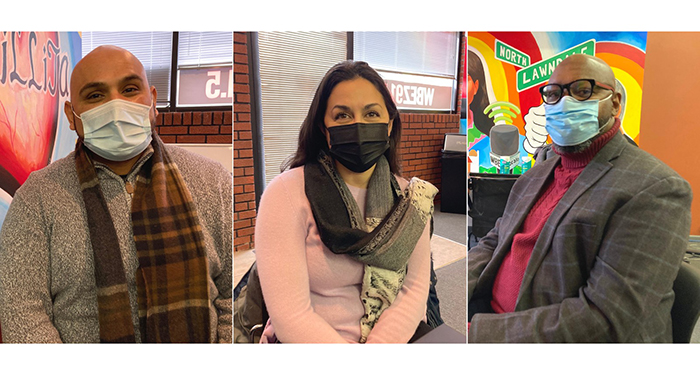
Image Source: Patrick Smith, WBEZ
Bocanegra, now a professor at the University of Illinois at Chicago, and faculty affiliate with the Great Cities Institute, is committed to making sure those people working to prevent shootings get more support than she gave her employee 10 years ago. To that end she just conducted a survey of about three dozen frontline Chicago anti-violence workers.
“I was so focused on making sure that we could continue to provide a service, to be in compliance with our grants, but also to help the community at a time when violence was surging, that I overlooked the wellness of that worker. And when they could no longer perform a task, they were let go,” Bocanegra said.

Panelists:
Eva Kail, Urban Planner, City of Vienna
Sara Ortiz Escalante, Urban Planner, Col·lectiu Punt 6
Stéphanie Dadour, Associate Professor, École Nationale Supérieure d’Architecture of Paris-Malaquais,
Laboratoire ACS UMR AUSser
Moderator:
Faranak Miraftab, Professor of Urban and Regional Planning and Acting Director of the Women and Gender in Global Perspectives Program, University of Illinois, Urbana-Champaign
Supported by UIUC Department of Spanish and Portuguese, Illinois in Vienna Programs, Women and Gender in Global Perspectives. This event is part of Villa Albertine’s City/Cité conference series.
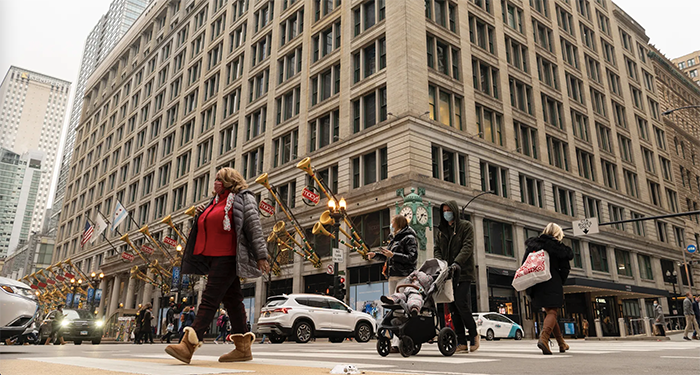
Image Source: Tyler LaRiviere, Sun-Times
A Chicago Sun-Times story looking at pandemic recovery by Chicago features perspective from Teresa Cordova, director of the Great Cities Institute and professor of urban planning and policy at UIC, and Matt Wilson, senior research specialist with the Great Cities Institute.
Teresa Cordova, director of the Great Cities Institute at the University of Illinois Chicago, also spoke of a manufacturing revival that could nurture entrepreneurship and create jobs that support families.
“One thing we learned in this pandemic is the importance of essential workers. They deserve our respect and livable pay,” she said.
Cordova, who also chairs the Chicago Plan Commission, spoke of how developers are captives of a boom-and-bust cycle, which often means too much gets built. Everybody needs to slow down and think about community benefits in large-scale projects and to make sure there’s enough affordable housing, she said.
A colleague of hers at the Great Cities Institute, economic development planner Matt Wilson, said Chicago could take the cars off some commercial streets and turn them into pedestrian-centered lanes or plazas. It would build on a city-sponsored experiment in some neighborhoods the past two summers that people, craving socialization with fresh air, seemed to like.
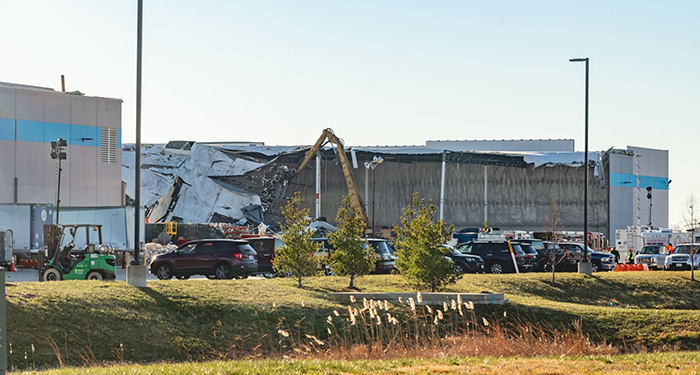
Image Source: Liam Kennedy, Bloomberg
A Bloomberg News story detailing safety guidance to Amazon employees in advance of the recent southern Illinois tornado includes comments from Beth Gutelius, research director for the Center for Urban Economic Development at UIC and senior research specialist with the Great Cities Institute at UIC.
Beth Gutelius, research director at the University of Illinois at Chicago’s Center for Urban Economic Development, said that Amazon warehouses typically have an intense pace, employees come and go swiftly and there are many contractors—particularly amid the holiday season.
“Between the contractors and rate of turnover, between the number of temporary workers and churn, it raises questions about how well prepared any of those workers were for an emergency event like this,” she said.
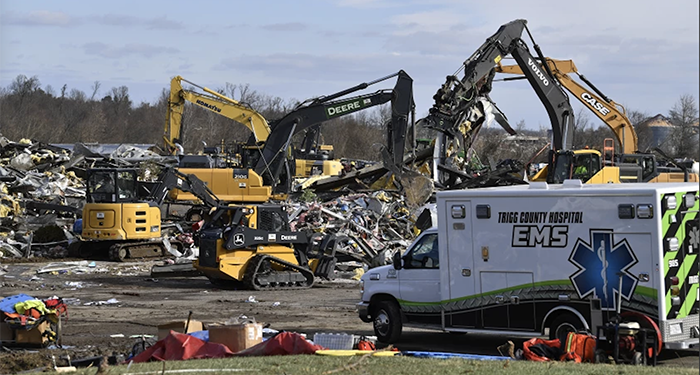
Image Source: Timothy D. Easley, Associated Press
Comments from Beth Gutelius, research director for the Center for Urban Economic Development at UIC and senior research specialist with the Great Cities Institute at UIC, and Marcus Dillender, UIC assistant professor of health policy and administration in the School of Public Health, are featured in a Los Angeles Times article about the possible need to adjust warehouse and factory emergency response plans and infrastructure to improver worker safety.
Companies that employ workers in massive factories and warehouses — in some cases thin, modern metal buildings that typically don’t have basements — should explore how to create infrastructure that can withstand powerful tornadoes, said Beth Gutelius, research director at the Center for Urban Economic Development at the University of Illinois-Chicago.
“We need to think about and plan ahead to make sure both buildings they work in and emergency preparedness protocols in place are as strong as they need to be and as proactive as they need to be,” Gutelius said.
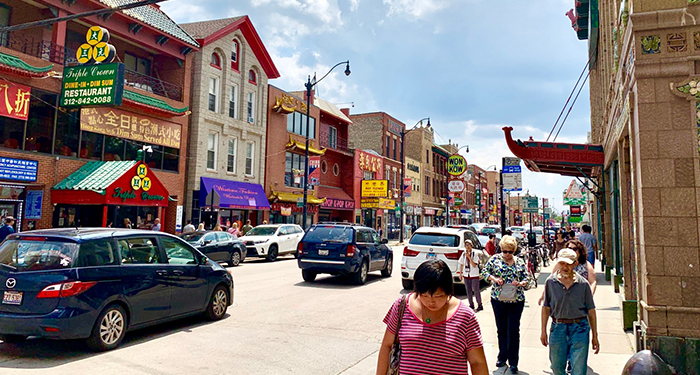
Image Source: Esther Yoon-Ji Kang, WBEZ
A WBEZ story on community continuity and racial equity in the Chicago aldermanic remap process includes perspective from Jim Lewis, senior research specialist at UIC’s Great Cities Institute, who addresses the difficulties and politics involved in achieving majority representation.
“It is just not possible to keep all communities that have some form of integrity together when you’re trying to solve these other remap problems,” said Jim Lewis, a researcher at the Great Cities Institute within the University of Illinois at Chicago.
Lewis explains that while aldermen are tasked with creating wards that are roughly the same population – about 55,000 people in Chicago – many are attempting to draw a map that creates as many majority-Black or majority-Latino wards as possible, to maximize the chances of sending minority candidates to council.
“That’s what happened in the last remap appears to be happening again in this one,” Lewis said.
“It may be that 50% is all you can get,” Lewis said. Still, Lewis said 50.03% may be enough to ensure a future Asian American alderman in City Council. “[It] comes down to the politics,” Lewis said. “I think if they are organized… and get out the vote and have a good candidate, then I think, absolutely, they can win.”
Lewis echoed that sentiment, adding, in general, “more disadvantaged communities — communities that have suffered more poverty — would benefit from more coherent representation” than communities that can advocate for themselves in other ways.
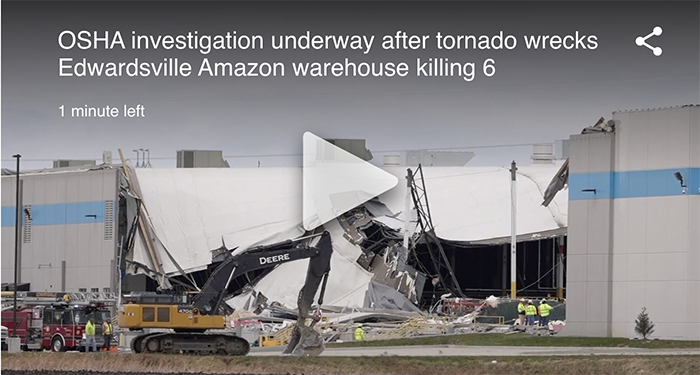
Video Source: Glenn Marshall, Associated Press
An Associated Press report on the tornado striking an Amazon delivery center in southern Illinois last week features analysis from Beth Gutelius, research director for the Center for Urban Economic Development at UIC and senior research specialist with the Great Cities Institute at UIC, who addresses workplace safety issues, the potential impact of climate change on the warehouse industry, and American consumer demand for fast shipping. Her comments also appeared in related coverage from Newsweek and PBS.
“We don’t think of warehousing as one of the industries that’s going to be severely impacted by climate change but then you have a case like this,” said Beth Gutelius, research director at the Center for Urban Economic Development at the University of Illinois-Chicago. “How do we make sure the facilities are built in a way to best protect the workers inside?”
Gutelius said its central location and cheaper costs has led the warehouse industry to triple over the past decade in the greater St. Louis area, of which Edwardsville is a part, growing faster than the industry nationwide.
Gutelius said she couldn’t help but view the tragedy as a spillover effect of American consumer demand for getting packages shipped quickly.